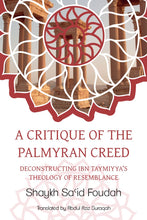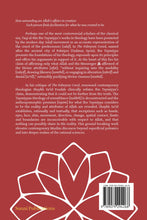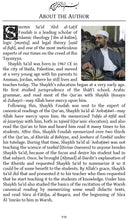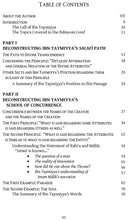
A Critique of the Palmyran Creed
Deconstructing Ibn Taymiyya's
Theology of Resemblance
Translated by Abdul Aziz Suraqah
First Edition 2018
Sunni Publications, Rotterdam
Paperback, 192 pages, 240 grams
ISBN 978-90-79294-26-8
How astounding are Allah’s affairs in creation
Each person finds facilitation for what he was created to be
Perhaps one of the most controversial scholars of the classical era, Taqi al-Din Ibn Taymiyya’s works in theology have been promoted by the modern day Salafi movement as an accurate representation of the creed of the predecessors [salaf]. In The Palmyran Creed, named after the ancient city of Palmyra (Tadmur, Syria), Ibn Taymiyya presents the foundations of his theology, expounds upon its principles and offers his arguments in support of it. At the heart of this lies his claim of affirming only what Allah and His Messenger ﷺ affirmed of the Divine attributes [sifat], “without inquiring into the modality [takyif], drawing likeness [tamthil], or engaging in alteration [tahrif] and denial [taʿtil],” ostensibly purifying Divine Oneness [tawhid].
In his critique of The Palmyran Creed, renowned contemporary theologian Shaykh Saʿid Foudah clinically refutes Ibn Taymiyya’s claim, demonstrating that it could not be further from the truth. The Taymiyyan theology of resemblance [tashbih] is deconstructed and the anthropomorphic premises [tajsim] for what Ibn Taymiyya considers to be the reality and attributes of Allah are revealed. Shaykh Saʿid establishes, rationally and textually, that ascriptions such as hands, eyes, face, shin, movement, direction, change, spatial contact, limits and boundaries are inconceivable with respect to Allah, and that nothing can possibly share in His reality. This ground breaking work elevates contemporary Muslim discourse beyond superficial polemics and into deeper realms of the rational sciences.







